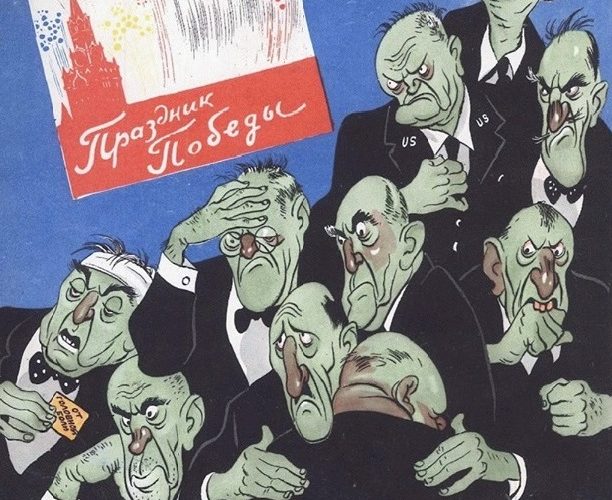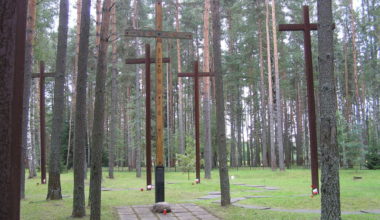All official statements that Western nations published on the occasion of the 75th anniversary of the victory over Nazi Germany
It was no surprise that the 75th anniversary of the victory over Nazi Germany was used as an opportunity to, once again, condemn ‘Soviet totalitarianism’. It was the joint statement by the U.S. Secretary of State and his Eastern European colleagues that set a new standard of such condemnation, a standard then developed, re-invented and reduced to absurd in multiple declarations and resolutions of the Baltic nations’ authorities. Even in Europe, though, there were also non-aligned countries.
State Dept. sets the standard
On May 7, 2020, a joint statement by foreign ministers of the United States, Bulgaria, Czech Republic, Estonia, Hungary, Latvia, Lithuania, Poland, Romania and Slovakia appeared on the official U.S. State Department website.
In the statement meant to celebrate 75 years since the end of WWII, the biggest part was actually devoted to ‘Soviet totalitarianism’. After a formalistic reference to the need to “pay tribute to the victims and to all soldiers who fought to defeat Nazi Germany and put an end to the Holocaust”, the statement told a story of the Soviet Union’s actions during the “cold war” rather than that of Nazi crimes.
“While May 1945 brought the end of the Second World War in Europe, it did not bring freedom to all of Europe. The central and eastern part of the continent remained under the rule of communist regimes for almost 50 years. The Baltic States were illegally occupied and annexed and the iron grip over the other captive nations was enforced by the Soviet Union using overwhelming military force, repression, and ideological control.”
“For many decades, numerous Europeans from the central and eastern part of the continent sacrificed their lives striving for freedom, as millions were deprived of their rights and fundamental freedoms, subjected to torture and forced displacement. Societies behind the Iron Curtain desperately sought a path to democracy and independence.”
The heads of the American and Eastern European foreign-policy agencies go on declaring that they are “working together toward a strong and free Europe, where human rights, democracy and the rule of law prevail. The future should be based on the facts of history and justice for the victims of totalitarian regimes.” Alternate views of the postwar developments in Eastern Europe, that do not go in line with the aforementioned ministerial opinion, are to be condemned as an “effort to falsify history.”
The joint statement did not bother to mention the Soviet contribution in the defeat of Nazi Germany. After a couple of days, U.S. authorities showed that such an approach originated rather from their principled stance than was a mere coincidence. On May 9, the official White House Instagram published a video of Donald Trump laying a wreath to the WWII memorial, captioned “On May 8, 1945, America and Great Britain had victory over the Nazis! “America’s spirit will always win. In the end, that’s what happens.””
Variations on the theme
After signing the joint statement published by the U.S. State Department, authorities in some of those Eastern European countries decided that they should also specify their position in separate statements. On May 7, 2020, the presidents of Latvia, Lithuania and Estonia came up with a joint declaration which was very much similar to the one by U.S. and Eastern European foreign ministers both in its structure and meaning. The statement by the Baltic presidents, again, did not mention the role of the Soviet Union in the Nazi defeat and the formation of the U.N. At the same time, it stated that NATO military bloc was a “founding stone for a New Europe” after WWII. Following their official concepts of national history, the Baltic nations mentioned “Soviet occupation” of the region that, in their view, fully originated from 1939 Soviet-German agreements.
The resolution of the Lithuanian Seimas dated May 8, 2020 is another example of how countries follow the common template of the VE-Day celebratory messages, firmly set by the joint statement by the State Department and Eastern European foreign ministries. Here, together with an incidental reference to victims of the Nazi-organized Holocaust, one can find an assertion that the murder of Jews in the Baltics was preconditioned, among other things, by the loss of Baltic sovereignty. This means that Lithuanian MPs accused the Soviet Union not only of unleashing the Second World War but also of the Holocaust. The final part of the Seimas’ resolution urges the European Parliament, parliaments of other Central and Eastern European countries, international organizations and communities not to put up with and oppose Russia’s historical revisionism and disinformation campaigns.
On the same day, the Seimas registered a new bill amending the national law on memorial days. The bill introduces a new memorial date, the Day of Soviet Aggression against Europe (September, 17). The promoters of the bill were Laurynas Kasčiūnas and Audronius Ažubalis, two MPs representing Homeland Union – Lithuanian Christian Democrats. The two are known for their public support of Jonas Norejka, a participant in the extermination of Lithuanian Jews.
SS legionnaires as victims of war
Unlike Lithiania’s Seimas, the support of VE day anniversary resolution in the Latvian Saeima was not unanimous. For the draft resolution, the far-right National Alliance managed to win support of the Saeima committee on the international affairs; on May 7, 2020 the Saeima passed the resolution with 65 votes for and 11 against. The document, meaningfully titled “On the 75th anniversary of the Victory in Europe and the need to create comprehensive understanding in Europe and in the whole world”, calls on to clamp down “Russia’s historical revisionism”, noting that Europe cannot unite until its historical memory stays divided.”
On May 8, 2020, a statement by Estonian defense minister Jüri Luik was published, meeting the U.S. State Dept standard in its form as well. The military man, however, does not seem to care about the bounds of decency which diplomats never cross. Jüri Luik includes “simple soldiers who followed the orders of aggressors and occupiers” (including those who served in the Estonian SS Legion), mentions the NKVD, the Red Army and the SS in a row, intentionally exaggerates the number of Estonian losses during the war. The minister also stresses that “Estonia and its NATO allies are doing their best to deter Russia and to avoid a new war.”
The United Nations’ Security Council became yet another public corner for an exercise in WWII rhetoric. Since May 1, 2020, Estonia has been enjoying temporary presidency in the Council. The country gained UNSC presidency for the first time in its history and used it on May 8 to hold an online meeting dedicated to the 75th anniversary of the VE-Day. During that session, Estonian foreign minister Urmas Reinsalu accused Russia of “exploiting the 9th of May to misrepresent history”, while his Latvian colleague Edgars Rinkevics stated that WWII ended almost 50 years after that day for his country. Again, heads of the Latvian and Estonian diplomatic missions recalled the idea of common responsibility of Germany and the USSR for the initiation of WWII.
The non-aligned
Unlike Eastern European countries, “good old Europe” decided not not mark the 75th anniversary of the Victory with judgments over “Soviet totalitarianism” or the need to deter Russia. In his public speech on May 8, 2020, French president Emmanuel Macron focused on the historic meaning of the Second World War for France, mentioning the contribution of the Allies. On the same day, German president Frank-Walter Steinmeier asked not to forget Nazi crimes. In a response to what the far-right Alternative for Germany leader said days before about the “controversial character” of May 8, 1945, the German president said it was the day of liberation for Germany and asked people to “free themselves from the temptation of the new nationalism.” Apparently, German president’s speech was focused on home policy rather than foreign affairs.
It was the German foreign ministry that, the day before, commented on the world policy issues related to the 75 VE-Day anniversary. On May 7, 2020, Spiegel published an article co-authored by Foreign Minister Heiko Maas and head of the Institute of Contemporary History (Munich), Andreas Wirsching. The article was actually an objection to the joint statement by the U.S. Secretary of State and his Eastern European colleagues. The German foreign minister publicly disapproved the attempts to shift responsibility for unleashing WWII to anyone but the Nazis. Maas wrote:
“We are urged to comment on the brazen attempts to rewrite history that took place over the past few months, which should not be necessary in view of the indisputable historical facts: Germany alone unleashed the Second World War when it invaded Poland. And Germany alone is responsible for the Holocaust, the crime against humanity. Whoever sows doubts about it trying to cast other nations in the role of a perpetrator, does injustice to the victims, exploits history as an instrument of its own, and divides Europe.”
Serbia was another European country that publicly disapproved the attempts to shift the blame on the Soviet Union for unleashing the Second World War. Permanent Representative of Serbia to the OSCE joined his CIS colleagues in a statement released on May 7, 2020 during the OSCE Permanent Council on-line session. The statement stressed the need to preserve historical truth about WWII and found it inappropriate to revise the legal consequences of the war.


